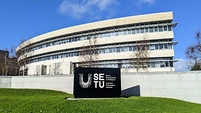Special rapporteur on child protection calls for 'inquiry into the inquiry' in Grace case

Vivienne Clarke
The special rapporteur on child protection, Caoilfhionn Gallagher, has welcomed the intervention of the General Solicitor for Minors and Wards in the ‘Grace’ case and called for “an inquiry into the inquiry.”
Speaking on RTÉ radio’s Morning Ireland, Ms Gallagher paid tribute to the decision by Marie Claire Butler, which was “really unprecedented”.
“She's obviously limited in what she can say for legal reasons, because of the confidential nature of Wardship, but it really is a further alarm call about this appalling process. And we must now add these very serious concerns, but extensive concerns made by the legal team for Grace not being included or at all referenced in the final report.
"We've got to add those to the very grave concerns raised by survivors and families, by the whistleblowers and by others who were involved in the process over the last number of weeks.”
Ms Gallagher said she was pleased to hear that Ms Butler was going to have a meeting with the Minister for Children.
“One of my really core concerns is Grace was nonverbal and she was let down over a very long period of time from 1989 to 2009 for 20 years when she was in an environment that she should not have been in, and 16 years later she continues to be failed. So, for me, I think we've got to look at, first of all, what is going to be done in relation to accountability for Grace and for Grace's family.
“Second, what it's going to be done about accountability and the investigation, which never happened in phase two for the other families and survivors who've been let down by this process.
“And thirdly, we need to learn lessons from the failures in this process to ensure that this simply never happens again. There's got to be essentially an inquiry into the inquiry, by which I simply mean there needs to be a quick fire review of what went wrong here procedurally, so we never again have a process which is so far away from trauma-informed and which lets down survivors, victims, families and whistleblowers. It's simply not good enough, and we must ensure this doesn't happen.”
Derval McDonagh, CEO of advocacy group Inclusion Ireland, also welcomed the intervention by Ms Butler.
The report had been a “further silencing of Grace”, she said.
“She's a woman with an intellectual disability. She's non-speaking. That was well established before the commission was put in place. And therefore her testimony and the way that she would communicate at the commission was obviously going to be not in a typical fashion.
"She wasn't going to turn up at the commission and give her verbal account of her experience. But people in her immediate environment, people who care for her, know her and love her, and her legal team, could have built up a very careful picture over time of her experience," Ms McDonagh said.
“It's a myth to say that people with intellectual disabilities who are non-speaking don't communicate. Everybody in this country communicates, but Grace communicates in different ways. And that is just as valuable as any verbal communication. And unfortunately, in this instance, it seems to be that her testimony, gathered carefully by her team over many years, was ignored or set aside, and it's simply not good enough.
"That has silenced her again. It has re-traumatised her. I spoke to a family member on the way in this morning who said that the commission has left families utterly broken. We have to listen to that. We can never do this again.”
Ms Gallagher added that whatever happened next, it was important to listen to Grace and Grace’s legal team.
The report process, despite costing millions of euros and taking such a long time, did not deliver answers and accountability as it was supposed to, she said. It was also damaging and re-traumatising.
“All eyes have got to turn to the government to see what the government is going to do about both the vacuum and accountability that we've seen and the disgraceful failures in the process. It wasn't the government's own process, but now the ball is in the government’s court to do what it needs to do, to put matters right for Grace and for the other survivors.”
Ms McDonagh said that the next steps would have to be co-designed and led by survivors and their families.
“They are the experts; they have gone through this excruciating process over the last number of years. They feel broken and bruised by the process. And they know what the best process is for them and for their loved ones, and we've got to listen to that and treat them as the experts that they are and hear the testimony of non-speaking people and treat that as just as valuable as speaking people.”






